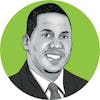 See
more of the story
See
more of the story
Early in her career, Octavia E. Butler's dystopian novels wouldn't sell.
The science fiction author's tales — featuring themes such as women's rights, political calamity, obstacles interrupting the progress of Black people and climate change — were not bestsellers.
Toward the final stage of her career and life, however, Butler's novels became more commercially and culturally respected. Her book, "Parable of the Sower" — our fourth selection for the Mary Ann Key Book Club — is prophetic. She died in 2006 but the popularity of her work continues to grow.
Although "Parable of the Sower" received praise throughout the literary world and earned the New York Times Notable Book of the Year award in 1993, it seems even more relevant today.
Sixteen years after her death, Butler's story about Lauren Olamina, a 15-year-old Black girl who lives in one of the few remaining safe havens near Los Angeles after the surrounding communities were destroyed by addiction, disease and war, still matters.
Her father is a preacher who aims to evangelize to the masses, and her mother wrestles with an addiction to prescription drugs. When her family is killed, she must navigate an arduous, dangerous path into a new reality as a young person with a condition called hyperempathy. She also represents, however, hope and possibility.
The book is set in the year 2025. What did Butler know? You could turn on any 24/7 cable news network today and witness the themes discussed in a book published nearly 30 years ago. Every day feels like a threat and nothing seems certain.
The constant barrage of pessimism has desensitized us. Most days, we have to search for a societal reason to smile.
A school shooting today, unfortunately, won't last longer than a few days in any news cycle. Violence in communities and disputes about how to address it puts poverty, racism, social injustice, educational disparities and other systemic challenges on the back-burner.
In our conversations about our book club's selection, we decided to center a work that features a measure of promise. Through the chaos, Butler begs us to see the light before it's too late.
Last year, I started the book club that I named after my great-great-great grandmother, Mary Ann Key, in partnership with Hennepin County Library, the Star Tribune and Friends of the Hennepin County Library. More than 2,000 members have joined and we continue to move forward with our initial goal: to encourage Minnesota to read, talk and change.
I think this is a book that will promote the latter.
We will discuss its themes and impact in a couple of upcoming conversations: a community event, via Zoom, with Tarshia Stanley of the Octavia E. Butler Society and Wagner College's vice president of academic affairs, on Oct. 6 at 7 p.m.; and through our first in-person panel on Nov. 3 at 7:30 p.m. at Minneapolis Central Library (Pohlad Hall).
Our panelists include three women who are familiar with Butler's work and also the path she had to navigate as a Black woman in America. Shannon Gibney, our moderator, is an award-winning teacher, writer and author, who has written both "What God Is Honored Here: Writings on Miscarriage and Infant Loss by and for Native Women and Women of Color" and a novel, "Dream Country."
Maya Washington is a Twin Cities native and filmmaker, actor, writer, poet, creative director and arts educator. She is the author and creator of the book/documentary, "Through the Banks of the Red Cedar," a story about her father, former Minnesota Vikings standout Gene Washington, and barriers that were broken by his Michigan State football team in the 1960s. Also, JaNaé Bates, communications director for both Yes 4 Minneapolis, the initiative to change policing in the city, and Isaiah MN, a collection of faith leaders across denominations and religions fighting for racial and economic equity.
I know these women can speak about the key elements of this fascinating book, but I'm most interested in their thoughts on Lauren's position. I am struck by the reality that Lauren is a child who must sift through the damage created by her elders and left behind for the next generation to solve and address.
As she preaches about a new way of life, a religion called "Earthseed," Lauren promotes a vision for simplicity and peace. "Now is a time for building foundations — Earthseed communities — focused on the Destiny," Lauren says toward the end of the book. "After all, my heaven really exists, and you don't have to die to reach it."
I was raised in the Black church and I always wrestled with that idea. Why was heaven only something that arrived after death? Why couldn't Black folks — and all folks — have more and better right here while we live?
In this book, Butler's message seems to be — years after her death — that, if we work toward common goals, rooted in our humanity, we still can.
Myron Medcalf is a local columnist for the Star Tribune and a national writer and radio host for ESPN. His column appears in print on Sundays twice a month and also online.





